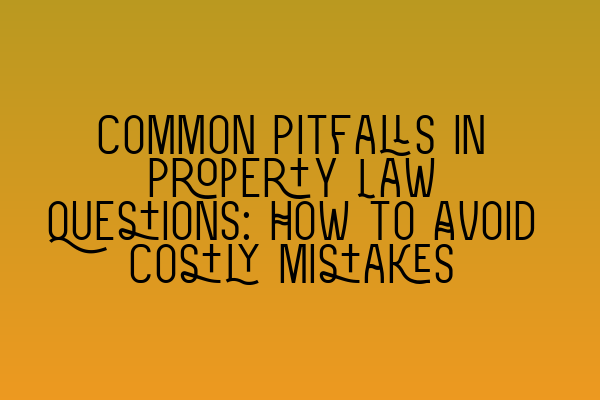Common Pitfalls in Property Law Questions: How to Avoid Costly Mistakes
At SQE Property Law & Land Law, we understand that property law can be a complex and challenging area of study. Whether you are a law student preparing for your exams or a solicitor seeking to enhance your knowledge, it is important to be aware of the common pitfalls that can arise in property law questions. By avoiding these mistakes, you can save yourself time, effort, and potentially costly consequences. In this blog post, we will discuss some of the most common pitfalls in property law and provide you with tips on how to avoid them.
1. Failure to Identify the Correct Legal Concepts and Principles:
One of the primary pitfalls in property law questions is the failure to correctly identify and apply the relevant legal concepts and principles. It is essential to have a solid understanding of fundamental property law doctrines, such as the distinction between real property and personal property, estates in land, and various types of property rights. By carefully reading the question and identifying the key legal concepts involved, you can ensure that your answer is accurate and well-structured.
2. Ignoring Case Law and Statutory Provisions:
Another significant pitfall is the failure to incorporate relevant case law and statutory provisions into your analysis. Property law is not just about abstract concepts; it also involves the interpretation and application of legal precedents and legislation. Remember to cite relevant case law and statutory provisions when discussing legal issues. This will demonstrate both your understanding of the law and your ability to apply it to the given problem.
3. Lack of Clarity in Legal Writing:
Clear and concise legal writing is essential in property law questions. Ambiguity and vagueness can lead to misunderstandings and ultimately result in incorrect answers. Take the time to carefully analyze the facts, organize your thoughts, and present your analysis in a logical and coherent manner. Utilize headings, subheadings, and paragraphs to structure your answer effectively. By doing so, you will make it easier for the marker to follow your argument and understand your reasoning.
4. Failure to Address All Relevant Issues:
Property law questions often involve multiple issues that need to be addressed. Failing to consider all the relevant issues can result in incomplete answers and lower marks. Before you start writing, read the question carefully and make a note of all the issues that need to be discussed. Structure your answer by addressing each issue separately, providing a clear and concise analysis supported by legal authority and reasoning.
5. Insufficient Use of Case Examples:
Property law is deeply rooted in case law. It is crucial to support your arguments with relevant case examples. By citing cases that illustrate the application of legal principles, you will enhance the credibility of your answer and demonstrate a thorough understanding of the subject matter. Make sure to refer to both leading cases and recent developments in property law to showcase your up-to-date knowledge.
6. Lack of Time Management:
Time management is crucial when answering property law questions, particularly in timed exams. Allocate your time wisely, ensuring that you spend an appropriate amount on each issue. Be mindful of the marks allocated to each question, and prioritize accordingly. If you find yourself running out of time, focus on providing a succinct analysis of the key issues rather than rushing through the entire question.
7. Failure to Review and Revise:
Finally, one of the most common pitfalls in property law questions is the failure to review and revise your answers. Always allocate time for reviewing your response, checking for errors, omissions, and clarity of expression. Pay attention to the structure of your answer and ensure that it flows logically from one point to another. Taking the time to revise will help you catch any mistakes and make improvements before submitting your answer.
In conclusion, property law questions can often present challenges, but by being aware of the common pitfalls and following the tips provided, you can avoid costly mistakes and improve your chances of success. Remember to accurately identify legal concepts, integrate case law and statutory provisions into your analysis, strive for clear and concise legal writing, address all relevant issues, utilize case examples, manage your time effectively, and review and revise your answers. By doing so, you will enhance your understanding of property law and increase your confidence in tackling property law questions.
For further resources and guidance on property law and related subjects, we invite you to explore the following articles:
– Understanding Contractual Capacity: Rights and Limitations
– Interactive SQE Mock Tests for Contract Law: Test Your Knowledge
– Join Our SQE Contract Law Webinars: Expert Insights and Guidance
– Contract Law Reforms: An Analysis of Recent Changes
– Parties in a Contract: Rights and Responsibilities
These articles provide valuable insights, interactive tests, and expert guidance on contract law, ensuring that you have a solid foundation for your property law studies.
By remaining vigilant and avoiding these common pitfalls, you can excel in property law and confidently navigate its challenging terrain. Good luck with your studies and legal career!
